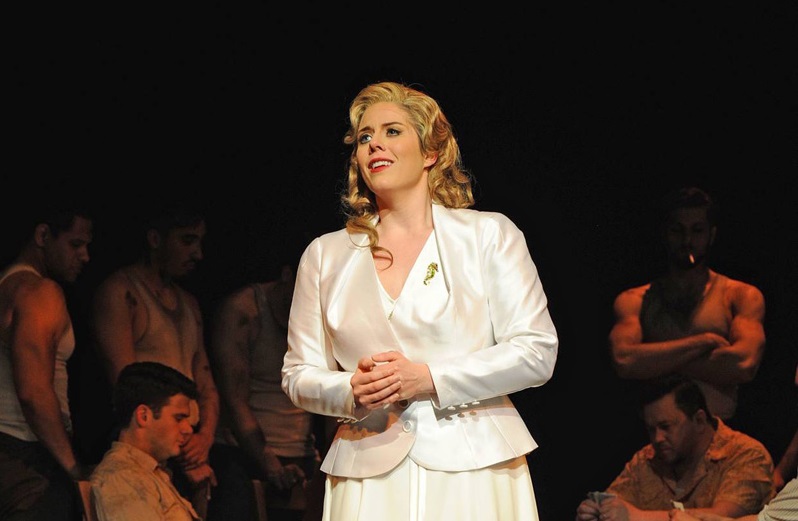
OPERATIC ‘STREETCAR NAMED DESIRE’ IN SAN JOSE
With Focus on a New Soprano as Blanche
SAN JOSE—Happy to say, André Previn’s wrenching opera “Streetcar Named Desire” has benefited from a streamlining with a smaller orchestra and trims in the libretto. Yet the drama remains as violent as a 8.0 earthquake, following closely the searing Tennessee Williams play.
Despite some miscalculations, Opera San Jose has brought off the work with fiery impact, propelled by a powerful Blanche Dubois (spinto soprano Ariana Strahl in her OSJ debut) who patterned her manner, looks and voice after Renee Fleming, the star of the San Francisco world premiere in 1998. The work, like so many out of Williams, traces the decline and fall of human relations and family values, with sex and egotism as major disruptive forces. A significant focal shift from play to opera was in shifting the spotlight from the vulgar slob of a husband, Stanley, to the fragile aging beauty Blanche, who in her descent from respectability falls prey to her own vanity and self-delusion. In the end she is victimized and driven to madness.
Despite the undeniable allure of a Fleming-like Blanche, this production under the international director Brad Dalton shows neither the fade nor the aging in the lovely Blanche, thus totally undermining one of the key plot elements. In the story, her inability to cope with losing her beauty makes her draw into her poetic fantasies that rile the earthy and violent Stanley and lead to her destruction. These poetic fantasies drew out some of Previn’s most evocative, tender music, particularly in her “Small Sea Air” swan song.
This streamlined version of “Streetcar” already played in numerous opera houses stretching from California to London has put the orchestra upstage and all the interpreters downstage. Much as in the play “Our Town,” sets and décor are eliminated, unless you count some chairs and furniture scattered about. And you have to imagine the rest. If you can, fine. Undeniably, having the singer/actors almost in the laps of the front-row patrons is powerful compensatory stuff.
But at the same time the impact of the orchestra, no longer in the pit down front, is remote and blunted. And this critic greatly admires the Previn orchestration, some of it modeled after Richard Strauss, including a brief quote out of “Rosenkavalier” which was easily missed. Previn is no mere unabashed late romantic; indeed, in the moments of greatest tension, his strings spew out spine-tingling dissonances and atonalities that forcefully convey the turning points. And these were forcefully conveyed by conductor Ming Luke and his 40 instrumentalists.
As the peacemaker and Stanley’s turn-the-other-cheek wife Stella, soprano Stacey Tappan brought a modest manner and lucid voice to the scene, with intermittent plausibility. Baritone Matthew Hanscom roared his way through the Stanley role (made famous by the young Marlon Brando in the play) like a bull in a china shop with little focus.
Oddly, much of the “scenery” of the show is provided by allegorical figures wandering in and out—some of Stanley’s uncouth bare-chested, blue-collar partying buddies from the factory, smoking throughout, and a ghost or two from Blanche’s better days—all ignored by the main players.
Philip Littell’s libretto (mostly dating back to the 1998 premiere) had altered the play’s text enough to make the vowels eminently singable—no mean feat.
The skillful title was based on the name of a trolley destination in New Orleans, the site of the action. While the section of town called Desire still exists, the trolley line was discontinued years ago, much to the dismay of T. Williams fans who relish his critical eye, social commentary and his Southern settings.
From here on OSJ fans will keep their eyes and ears out for the radiant soprano Strahl, a fast-rising Berkeley resident who had spent two years at the Komische Oper in Berlin.
André Previn’s “Streetcar Named Desire” in three acts, two intermissions, 3 hrs. 10 min. running time. At California Theatre, San Jose through May 1. An Opera San Jose production. For info: (408) 437-4450, or go online.
©Paul Hertelendy 2016
#
Paul Hertelendy has been covering the dance and modern-music scene in the San Francisco Bay Area with relish — and a certain amount of salsa — for years.
These critiques appearing weekly (or sometimes semi-weekly, but never weakly) will focus on dance and new musical creativity in performance, with forays into books (by authors of the region), theater and recordings by local artists as well.
#